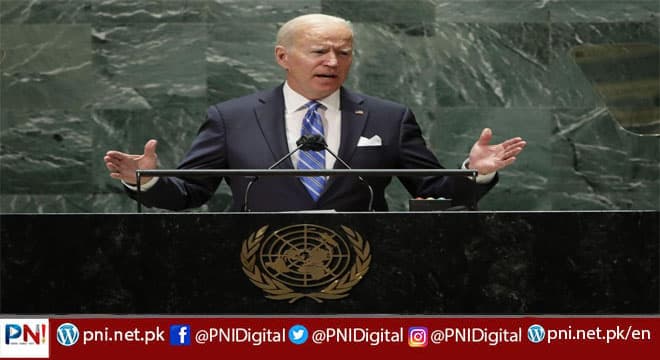UNITED NATIONS, Sep 21 (APP):President Joe Biden said Tuesday that by ending the war in Afghanistan, the United States is swapping relentless war with relentless diplomacy” as UN general Assembly kicked off a debate on the grave challenges confronting the world.
In his first address as president, Biden noted his decision to end America’s longest war last month in Afghanistan aimed at shifting U.S. attention to intensive diplomacy, saying he is driven by a belief that “to deliver for our own people, we must also engage deeply with the rest of the world.”
“We’ve ended 20 years of conflict in Afghanistan,” Biden said. “And as we close this period of relentless war, we’re opening a new era of relentless diplomacy of using the power of our development aid to invest in new ways of lifting people up around the world.
Over 100 world leaders are participating the debate in person, with attendance in the iconic hall of the General Assembly scaled down as a precaution against the coronavirus pandemic.
Prime Minister Imran Khan will address the 193-member Assembly on Sept. 24.
Biden, who arrived in New York on Monday evening to meet with U.N. Secretary-General Antonio Guterres ahead of Tuesday’s address, fully endorsed the world body’s relevance and ambition at a difficult moment in history.
The President committed $10 billion dollars to end world hunger, and called for support from multi-lateral institutions like the United Nations to help combat challenges including the Indo-Pacific.
We are not seeking a new cold war, where the world is divided US is ready to work with any nation that pursues peaceful resolutions because we have all suffered consequences of our failure, he stated.
Amid growing tensions with China, Biden also declared the U.S. is “not seeking a new Cold War.”
Without mentioning China directly, Biden acknowledged increasing concerns about rising tensions between the two nations. But he said, “We are not seeking a new Cold War or a world divided into rigid blocs.”
The meeting began with an address by the UN chief, highlighting the themes which will be explored in the 76th session of UNGA. I am here to sound the alarm. The world must wake up, he said.
Seeking to draw contrasts with Donald Trump, his predecessor, President Biden, in his address, spoke about revitalizing alliances around the world, stressing U.S. support for NATO’s mission in Europe as well as reaffirming its desire to work closely with the European Union and the countries in its Quad group: Australia, India and Japan.
“We will stand up for our allies and our friends,” he said.
He also highlighted the American re-engagement with the Paris Accords, with the threat of climate change a recurring theme of his speech.
But Biden is likely facing a healthy skepticism from allies during his week of high-level diplomacy. The opening months of his presidency have included a series of difficult moments with friendly nations that were expecting greater co-operation from Biden following four years of Trump’s “America first” approach to foreign policy.
Eight months into his presidency, Biden has been out of sync with allies on the chaotic ending to the U.S. war in Afghanistan. He has faced differences over how to go about sharing coronavirus vaccines with the developing world and over pandemic travel restrictions.
Biden also finds himself in the midst of a fresh diplomatic spat with France, after announcing plans along with Brritain to equip Australia with nuclear-powered submarines. The move is expected to give Australia improved capabilities to patrol the Pacific amid alleged concern about the Chinese military’s increasing power, but it upended a French defence contract worth at least $66 billion to sell diesel-powered submarines to Australia.
French Foreign Minister Jean-Yves Le Drian said Monday there was a “crisis of trust” with the U.S. as a result of the episode.
Others speaking Tuesday include Chinese President Xi Jinping, who will deliver a video address.
Follow the PNI Facebook page for the latest news and updates.









